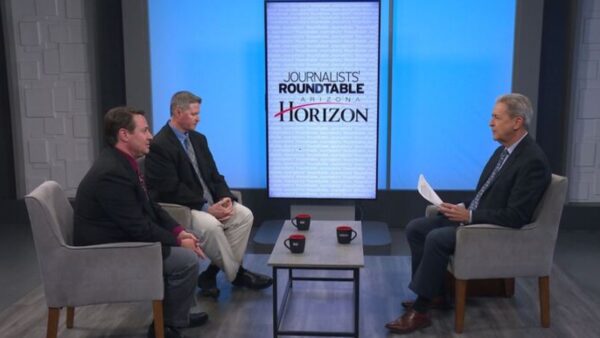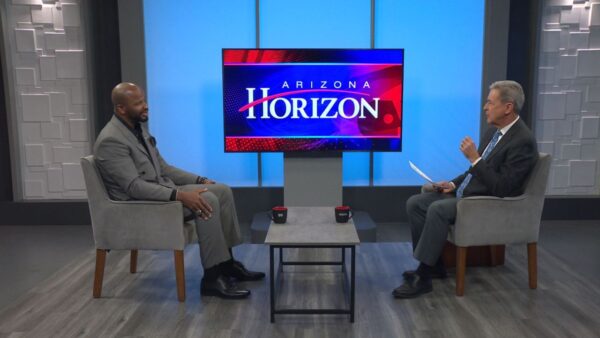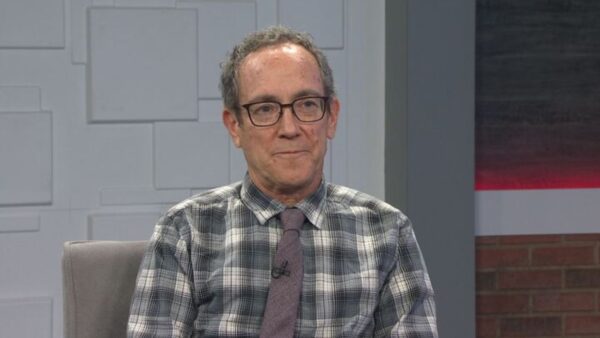Alien life could exist on earth right under our noses, or even in our noses. That’s some of what Arizona State University cosmologist Paul Davies covers in a new book, “The Eerie Silence: Renewing Our Search for Alien Intelligence.” Davies will talk about alien life and his new book.
Ted Simons: Could there be E.T.s among us? That's the question that Arizona State University professor Paul Davies tackles in his new book, "The eerie silence. Renewing our search for alien intelligence." Here to talk about the search for alien life is Paul Davies. Good to have you back on the show. Biologically-based alien organisms, could they be here?
Paul Davies: What I'm suggesting is that up to now, it's all life on earth is the same life and even the microbes that we don't notice are the same life as you are me, but I'm suggesting that it could be that some of them belong to a separate tree of life and maybe originated separately on earth a long time ago, maybe from space, but they could be among us.
Ted Simons: Have we been looking in the right ways heretofore?
Paul Davies: Nobody has been looking. Talking microbes only and the thing about microbes, 99% has not been touched. It's a mystery. And so I think among those microbes could be some which represent a separate event.
Ted Simons: We've been caught in a trap searching for E.T. who look like us?
Paul Davies: Most people think of intelligent alien life. Bacteria would be descended from a separate event. If life is formed twice on earth, then surely it's formed on many earth-like planets around the universe.
Ted Simons: When you write a shadowed biosphere, is that what you're referring to? Explain that.
Paul Davies: It's known as a shadowed biosphere because we don't see it, the idea is they're intermingled among the organisms we know and love could be microorganisms representing a separate form of life. A different type of life, it could be life but not as we know it.
Ted Simons: The idea being if that could happen here, it could happen anywhere.
Paul Davies: If it can happen twice on earth, it can happen all around the universe. We have life 1.0, we're looking for life 2.0.
Ted Simons: How long have you been looking for life 2.0?
Paul Davies: A number of different research programs. One taking place at mono lake in California. Could use arsenic in the place of phosphorus. But we're trying to make educated guesses where the life could lurk, deep in the ocean, up in the sky, all sorts of places we might look and it's only recently that people have begun doing that.
Ted Simons: I know the book coincides with the 50th anniversary of the first attempt to turn a telescope.
Paul Davies: Today is the 50 anniversary of the courageous attempt to turn a telescope on a nearby star to see if E.T. might be sending a message. It's been 50 years of silence, all that they've got so far is a eerie silence. Are we alone in the universe after all or looking for the wrong thing at the wrong time?
Ted Simon: Answered your own question there. What do you think?
Paul Davies: I think we should be looking for much more than radio signals. Up in the heavens and down here on earth as well.
Ted Simons: And when we were talking, if somebody were to register right now, if we got some sort of radio wave, or intelligent life force -- hi, I'm here, where do I park? That means this life being would have had to broadcast this message how long ago?
Paul Davies: You could guess how near they are. But most optimists would say the closest would be about a thousand light-years. If they're sending a message, they would have had to send it a thousand years ago to get a reply. The milky way galaxy is a thousand light-years across.
Ted Simons: They would have had to see by way of a thousand years first, a thousand years to register and another to send, they would have seen the earth with pyramids.
Paul Davies: As they were there before there were radio telescopes so the big problem about this search for alien messages, they're going to have to wait another thousand years before they hear my words so this conversation is going to leak out into space. There's nothing we can do about that. It's going to travel at the speed of light, we can't get it back, and they'll pick up the conversation and say, ha! There is intelligent life.
Ted Simons: We talked about this before, and I know you're writing about this in the book. Are we ready psychological if we get a tap, tap, tap?
Paul Davies: I am. Whether anyone else is, I don't know. I chair a taskforce and it's our job to think about the consequences to society and religion and science and technology and people generally if we suddenly discover we're not alone because it will be the biggest discovery in history.
Ted Simons: Would there be panic in the streets?
Paul Davies: I don't think so. It profoundly changed our view of ourselves and view in the universe. I don't think anyone panicked.
Ted Simons: Again, 50 years of radio silence. You're saying that's like picking up a pebble here and not seeing the big lizard over there. When you concentrate on a corner of space, you're likely not going to get much.
Paul Davies: The people who use the radio telescope to listen in night after night -- give us a chance, it's only 50 years. We've only searched a tiny corner of the universe. We need to look for other things as well. Any signs of technology, they may be very subtle.
Ted Simons: Are we committed to doing that?
Paul Davies: If by we, the United States government, they're not spending money at all. It's privately funded. But there are scientists who think this is a good way to go. And continue for another 50 years.
Ted Simons: Good to have you back on the show.
Paul Davies: My pleasure. Thanks.
Paul Davies:Arizona State University cosmologist;




















